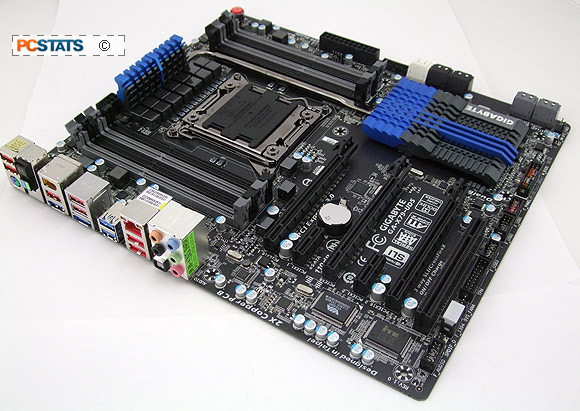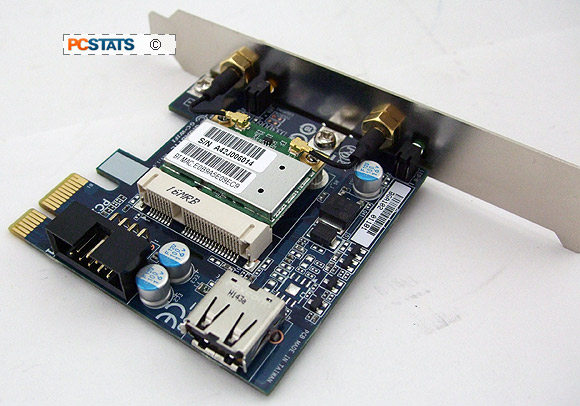 Gigabyte
released four platform variations on the Intel X79 chipset, the replacement to
Intel's X58 / Nahalem platform. The mainstream -UD3, the high end -UD5 that
PCSTATS tested in this review and an overclocking centered -UD7 model. A final
variant is the gamer/overclocker focused G2.Assassin that runs about $500 bucks.
Gigabyte
released four platform variations on the Intel X79 chipset, the replacement to
Intel's X58 / Nahalem platform. The mainstream -UD3, the high end -UD5 that
PCSTATS tested in this review and an overclocking centered -UD7 model. A final
variant is the gamer/overclocker focused G2.Assassin that runs about $500 bucks.
The Gigabyte GA-X79-UD5 is the only motherboard of the
bunch with eight DDR3 memory slots, making it capable of supporting an
astounding 64GB of RAM. To say it's got potential is an understatement.
As we've seen in this in-depth review, Gigabyte's
GA-X79-UD5 motherboard is an excellent platform at $320 USD/CDN for content
creation/high end workstation tasks in most every respects. It has plenty of
memory capacity when paired with Windows 7 x64, loads of connectivity and
storage head room, and offers good value when equipped with the $260 Intel Core
i7 3820 Sandy Bridge-E processor.
The LGA2011 platform has 40 PCI Express lanes to dish
out so three-way graphics is easily supported if you can afford such luxury.
Curiously, the Intel X79 core logic is not a whole lot
different than the Intel Z68/P67 chipsets in terms of supported features, ports
and PCI Express lanes. Some reviewers have even suggested that Intel's original
LGA1155 'Sandy Bridge' platforms offer a better value platform as the CPU-to-CPU
performance is comparable, but total system cost dramatically reduced. This is
true in some respects as you've seen in the benchmarks, but not entirely so. The
increased number of cores under the built of Sandy Bridge-E (8 logical vs 4) and
higher clock speed give LGA2011 a distinct advantage, just as much as the
increased Cache size and additional memory channels do in memory-specific
benchmarks like Sandra.
Overclocking is also far and away easier than you would
expect from a partially unlocked processor. In PCSTATS tests we had no
difficulty whatsoever increasing the CPU multiplier as high as Intel allows and
enjoying the benefits that a boost from 3.6GHz to 4.3GHz afford.

Bundled GC-Wifi
802.11n/g/b and Bluetooth Smart 4.0 card
Deciding which motherboard you'll use to assemble a
powerful Content Creation computer system or killer Gaming Rig around is a
challenging question. Even enthusiasts, who tend to approach the question
backwards, starting with the chipset or CPU and then figuring out the rest,
sometimes get stuck deciding between motherboards. Motherboards are in every
sense the foundation of all your upcoming PC's glory, or maddening frustration
and failures. It pays to choose wisely.
As it stands, Gigabyte's GA-X79-UD5 is a fantastic
motherboard for a dual-videocard gaming system because it offers two/three-way
SLI/Crossfire support, a good amount of USB 3.0 and plenty of SATA III. Bottom
line, let these benchmark results serve as a reminder of the potential that
Intel's 2nd Generation Sandy Bridge-E processor brings to the table.
As we've seen over the course of this extensive review,
the Intel X79-based Gigabyte GA-X79-UD5 is a mostly fantastic platform and rock
solid foundation to assemble a new PC on. PCSTATS was generally unhappy with the
laggy 3D BIOS but even that disappointment wasn't a deal breaker in our books.
Given the memory capacity this board can handle, the expansive SATA III ports
and clean layout, we'd highly recommended the GA-X79-UD5 for anyone
contemplating the move from a 32-bit operating system environment to 64-bit. A
motherboard like the Gigabyte GA-X79-UD5 will get you in the game with plenty of
room to grow for several years down the road. That's the kind of future proofing
PCSTATS can certainly recommend!

Find out about this and many other reviews by joining
the Weekly PCSTATS Newsletter today! Catch all of PCSTATS latest
reviews right
here.
Related Articles
Here are a few other articles that you might enjoy as
well...
- ASUS P8P67 Pro Intel P67 Motherboard Review
- ASUS P8H67-M Evo Intel H67 Express Motherboard
Review
- ECS H67H2-M Black Edition Intel H67 Express Motherboard
Review
- Biostar TH67XE Intel H67 Express Motherboard Review
- Gigabyte GA-P67A-UD7-B3 Intel P67 Motherboard Review
- Gigabyte GA-Z68X-UD5-B3 Intel Z68 Motherboard Review
- Gigabyte GA-Z68XP-UD3-iSSD Intel Z68 Motherboard &
Intel 20GB SSD Review
